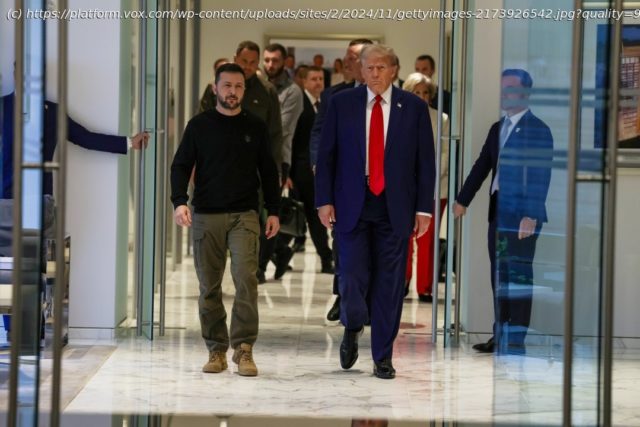Ukraine still thinks it can win over Trump, but the pitch needs to change.
The relationship between Donald Trump and Ukrainian President Volodymyr Zelenskyy has always been, to put it mildly, a little complicated. In 2019, there was the “perfect phone call,” in which Trump allegedly leveraged US aid to Ukraine to pressure Zelenskyy to investigate Hunter Biden. And the more recent awkward meeting in New York during the 2024 presidential campaign in which Trump talked about his good relationship with Vladimir Putin in front of the man whom the Russian leader had reportedly tried to kill.
But Trump has also expressed some grudging admiration for Zelenskyy, a fellow TV star-turned-politician who has demonstrated he knows how to close a deal. “I think Zelenskyy is the greatest salesman in history — every time he comes into the country, he walks away with $60 billion,” Trump said at a rally in September.
But after Trump’s return to the White House, Zelenskyy may now have his toughest “sales” job yet. Zelenskyy quickly congratulated Trump on his victory and the two held an initial phone call last week which was joined — in a likely sign of strange things to come — by Elon Musk, and described by Ukrainian officials as somewhat reassuring. Trump also reportedly spoke with Putin over the weekend, according to the , though the Kremlin has since, confusingly, denied it.
The conventional wisdom is that Trump’s election is a major setback for Ukraine, coming at a moment when it is already losing territory and troops at a slow but steady rate to Russia’s relentless advance and when its civilian population is likely in for another brutal winter due to Russian strikes on the country’s energy grid. Opposition to support for Ukraine has become a core position of the Republican Party’s MAGA wing, and GOP opposition earlier this year held up a major aid package to Ukraine for months.
Trump himself has blamed Zelenskyy for starting the war. He has also promised to end the fighting in 24 hours once in office. It’s not clear how he plans to do that, but Vice President-elect JD Vance has suggested it would involve freezing the current front lines in place and Ukraine declaring its neutrality and giving up its ambitions to join NATO. (Though Zelenskyy has mostly avoided directly criticizing Trump, he has described Vance as “too radical.”)
Ukraine’s government would view a “deal” like this as full surrender, and argues, with reason, that Russia shouldn’t be trusted to maintain a ceasefire: Putin could always try again to take more territory or even Kyiv itself after a pause to replenish his losses.
But while the conventional wisdom may be true that Trump’s win is a blow to Kyiv, Ukrainian leaders are still expressing some cautious optimism that they can work with the new administration. The pitch from “the greatest salesman in history,” however, is going to have to change. Selling Ukraine
One thing you likely won’t be hearing as much: talking points about defending democracy or upholding the rules-based international order, which both Zelenskyy and Joe Biden frequently used over the last two years since Russia’s invasion. Such rhetoric is likely to fall flat with Trump, given his often nakedly transactional approach to foreign policy and general fondness for authoritarian leaders.
Speaking on a press call hosted by the think tank German Marshall Fund on Friday, Hanna Hopko, a former Ukrainian parliament member and co-founder of the International Center for Ukrainian Victory, an advocacy group, made the change clear.






